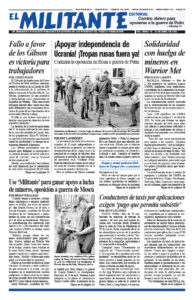For weeks in 2020 hundreds of thousands of working people joined an uprising to bring down the regime of President Alexander Lukashenko in Belarus after he stole the presidential election. With backing from Russian President Vladimir Putin, Lukashenko put down the revolt in blood.
But the impact of his regime’s assaults had a lasting impact on millions across the country, affecting both their response to Moscow’s invasion of neighboring Ukraine and limiting the options for Lukashenko. The Belarusian president has so far been unable to send troops to fight alongside Moscow’s forces in Ukraine, fearing that doing so could undermine the morale and cohesion of his army.
Hundreds of Belarusians have volunteered to join the war to defeat the Russian rulers’ Ukraine invasion, in solidarity with the Ukrainian people and to strengthen opposition to Lukashenko at home.
“Without an independent Ukraine, there won’t be an independent Belarus,” Pavel Kulazhanka, one of the volunteers now defending Kyiv, told the Wall Street Journal.
Another volunteer from Belarus told the Washington Post he was originally from Russia and had joined the fight because he wanted to show Ukrainians that there were Russians who supported their right to independence.
Many of the volunteers are in the Kastus Kalinouski Battalion, formed out of Belarusians who joined Ukrainian territorial defense units in Kyiv. So far three have been killed. The battalion is named after the leader of a Belarusian uprising in the 1860s against the imperial rule of the Russian czars. There is another Belarus battalion, Pahonia, along with Belarusian units in Ukraine’s territorial defense forces in Odesa and Lutsk.
In Belarus more than 800 people were arrested Feb. 27 from among the thousands demonstrating against Putin’s invasion launched three days earlier. Over the past year and a half, Belarusian cops have arrested more than 35,000 in the wake of the mass movement against Lukashenko. In 2020 hundreds of Ukrainians joined the protests in Kyiv in solidarity with the struggle to oust Lukashenko and win political rights.
This February Lukashenko approved constitutional changes that allow the government to invite the Putin regime to station troops it currently has in Belarus there permanently, and to invite Moscow to place its nuclear weapons there.
Lukashenko’s regime is stepping up arrests of rail workers it accuses of sabotaging railway lines in the Gomel and Brest regions that were used to move Russian troops and weaponry from Belarus into Ukraine. Three Belarusian men were shot and injured as they were arrested by police March 30, and a fourth April 1, accused of damage to railway equipment. At least eight Belarusian rail workers who were arrested earlier last month face up to 15 years imprisonment.
The Belarusian ministry of the interior says its special forces have begun patrolling the rail corridors.

